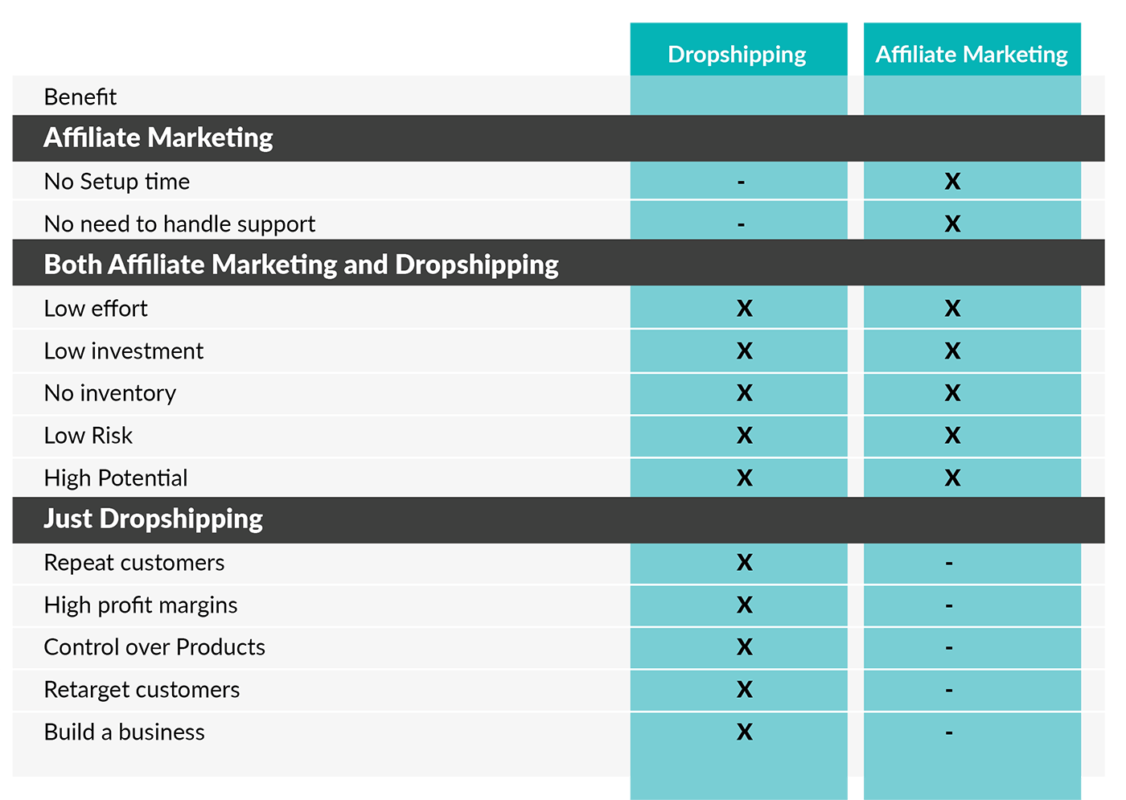If you're new to dropshipping, you might be wondering how it's different from affiliate marketing. In fact, this is a question I get quite often from people who have been successful in the online marketing industry for a while. Which one is easier to manage? Which one is more likely to bring profit? Is it easier to grow a dropshipping business than an affiliate marketing one?
Both have their similarities and benefits, but at the same time, there are some notable differences that you should be aware of. In this article, we will break down dropshipping vs affiliate marketing so that you know which one works best for you.
What Is Affiliate Marketing?
For those of you who don't know, affiliate marketing had its heyday in the early 2000s. As people started to sell more and more products online, they would recruit others to do the selling on their behalf. You would be given an affiliate link to share with your audience and for everyone who purchased through your link, you would earn a commission on the seller's sales.
Fast forward to 2019 and this is essentially what influencer marketers are doing.
So, if you're an affiliate, you can enjoy the following affiliate marketing pros.
- Don't need to hold inventory
- Don't need to process payments
- Could generate traffic through your social accounts without even having a website
- Get paid a fixed commission on someone else's product
Sounds great, right?
But there's one problem…
You're just the middleman! You're driving customers to someone else's product, growing their business and you are paid a commission that they set. Below are just a few affiliate marketing cons:
- The customers are not growing your business
- You won't get repeat business
- Your passive income is dependent on the seller paying you your commission
- You compete with all other affiliates for sales
The question is… Do you want to be one influencer or the seller who has hundreds of influencers sending visitors to their site, advertising their products?
The Concept of Dropshipping
While affiliate marketing only slightly involves you with a company or manufacturer, dropshipping brings you deeper into the commerce industry. With dropshipping, you own the store. You are not just a marketer, but a business owner. That's a far more advantageous position for long-term success.
Dropshipping allows you to create your own prices. Your profit will be the amount of money that remains once you subtract the wholesale price from the sale price. However, with dropshipping, you will be the one responsible for handling the marketing and customer support.
Once an order is made, you need to forward it to the dropshipping supplier and make the payment to them. The supplier will then pack up your order and send it to your customer on behalf of your store. This business model is a great choice for those who want to own a store but do not have the storage space to do so.
Here are several advantages that make dropshipping a potentially beneficial option:
- Relatively low risk, since you pay for products after the order is made
- The price setting is under your control, which means that you can also control the profit
- You have the opportunity to build your brand
- The profit margin has the potential to be high
- You can later expand to sell your own products
- You may retarget the customers through advertising
Dropshipping gives you the same advantages of owning your own store without the associated risks. Still, it's not all just rainbows and sunshine. There are a couple of drawbacks that you need to keep in mind:
- The dropshipping market is becoming rather saturated nowadays
- You have no control over the quality of the product or the packaging
- You need to be in charge of the service and customer support for the products, even if you didn't manufacture them
While there are some challenges to being a dropshipper, you can minimize the risks. The most important is that you do your research so that the products you provide are as qualitative as possible. You can learn what your users are looking for by interacting with them.
When I started my first dropshipping store and I spoke to our users, there was only one overwhelming reason for it. We're on this journey to create a sustainable business for our families to have the lives we all want.
Which One Is Best for You?
If affiliate marketing is the “get rich quick” way to make money online, then dropshipping is the “steady investment”.
With dropshipping, you:
- Create and design your store
- Find and add products, regularly updating them
- Control your profit margin
- Process payments from customers
- Handle customer support and returns
- Promote your store or hire others to do so (such as influencers/affiliates)
This gives you the same benefits without the downsides:
- You don't need to hold inventory (the supplier dispatches all items)
- You don’t need to process payments directly (your e-commerce Platform does that)
- Your e-commerce platform hosts the store so there's nothing technical to worry about
- You can still generate traffic through your social accounts
Rather than being paid a commission which is a fraction of the profit on the item, you take the whole profit: selling price – cost of goods.
Affiliate marketing has been the dominant way to start making money online in the past decade. That’s because only until very recently was it possible to handle all these elements of a business yourself.
Three years ago, you would have needed a team to manage a Shopify business. Today, you can do this with a few clicks by following the steps that have been laid out for you by people who have successfully traveled the journey.
Shopify aims to automate the entire technical process of running a store, from hosting to processing payments. On the other hand, Dropified aims to automate the entire process of sourcing products and ordering them from suppliers who will then dropship the items.
This means you can benefit from:
- Setting your own profits on the products you sell
- Any advertising draws more and more visitors to your site
- Customers can become repeat customers
- You build a business that can support you for the future.
If you're looking for a hands-off approach, then try the affiliate marketing route. If you're looking to control the products that you're selling and have more influence over how you sell them, then dropshipping might be for you.
To make it easier to see the differences, I created this table to help you weigh up the pros and cons of each:

Comparing Affiliate Marketing vs. Dropshipping
Now that you have a basic understanding of how affiliate programs and dropshipping work, it is time for you to take a deeper dive into the features they both provide. This will make it easier for you to understand which option works best for you as an online business.
Ease of Running
The first thing that most people want to know when making money online is “Which option is easier?” This will depend on various aspects. None of these models are easy to go through, and they both have some challenges that you need to overcome.
For instance, if you are looking at an affiliate program, then building a loyal audience is very important. No one will be willing to purchase your recommended product if they cannot take your word for it. And if no one buys the items that you recommend, then you will not get that commission.
As an affiliate marketer, you need to spend a lot of time and effort creating high-quality content and interacting with your audience. You can't just start a blog and hope to make a sale from the first post. For some affiliate marketers, it may take years until they are able to make some decent passive income out of this.
Dropshipping brings different difficulties to the table. You need to handle various tasks by yourself, including customer service, setting the prices, and managing the inventory. You are responsible for each sale, which can take a lot of effort. You also have to put together a good marketing strategy, as you need plenty of sales if you want to make any profit.
No matter the option you go for, you need to go through some initial effort. Your business has to gain momentum; otherwise, it will not be found by your clients. You should also make sure you hang onto that momentum and keep working on your business, lest you see a decrease in profits.
Time Commitment
When comparing affiliate marketing vs dropshipping, many business owners have one more thing that they care about: how much time will this take out of their busy schedule? I find this is a relevant concern for many people, as some are only doing it for passive income. They already have a day job, so they're simply hoping to increase their earnings with a little side business.
With an affiliate program, you need to create the content necessary to promote the affiliate product. If you are just starting out, then this might take some time. For search engines to notice you, you must post consistent high-quality content, so Google chooses you among the masses.
There is also the time it takes to find companies who are willing to let you be an affiliate. Sure you can use an affiliate marketing service but those come with lower profits. The big affiliates understand that direct relationships are best. Unfortunately finding the right person may be harder than you'd expect, so you willl need a tool to help you find an email address for the right contact.
Once you have passed the Google search test and have earned the trust of your readers and have a network of companies with higher payouts, passive income can come your way while you sleep. Every time someone stumbles across one of your links and makes a purchase, you will receive a payment for it. Depending on how many products you have listed and how persuasive you are, you can earn money even from your old blogs.
Dropshipping asks for a little more involvement. Not only do you need to set it up, but you also have to handle all the logistics of the business yourself. You must find the suppliers, send out the orders when they appear, negotiate the terms, and talk with the customers when potential issues arise. Automation can often take care of this for you, but this also depends on the platform or provider that you are using.
Startup Costs
If you want to become successful as a business owner, then you need to make an initial investment. The greater the investment, the more challenging it may be for you to get some profit, especially in the early stages.
When it comes to dropshipping, you may have to pay quite a bit in startup costs. Not only do you need to set up the shipping logistics, but you also have to subscribe to a reliable e-commerce platform. Depending on where you choose to hold your online store, the fees can be different. Some ask for yearly fees, whereas others require monthly payments.
Becoming an Amazon associate is often less expensive, as you just need a blog. Some website platforms require payment, but you can go for the completely free ones as well. As far as everyone is concerned, you can even be an affiliate marketer through social media posts. If people click and buy through the links you've provided, then the platform that you are using is not that important.
However, you may need to pay for your marketing campaigns. After all, your whole revenue relies on the fact that you have enough traffic coming your way. If your target audience cannot find your content, then you will not make any sales either. If you don't have a large following base, then you may need to pay for things such as pay-per-click ads or other types of sponsored content. Depending on your writing skills, you may also have to hire someone to handle your search engine optimization (SEO), which helps Google see you.
Risks Involved
If you want to gain a higher profit margin, then it's normal that you will also be concerned about the risks. When it comes to dropshipping, the risk is fairly low, as you don't have to hold the inventory yourself. Everything that has to do with inventory management is to be handled by the suppliers themselves.
However, your risks are mainly tied to customer satisfaction. As far as your clients are concerned, you are the one in charge of the product. Therefore, if the supplier you chose does not focus on quality, all the heat will fall on you. The supplier may also fail to deliver the product on time, which may lead to customer dissatisfaction and cancellations. Your digital marketing for the shop may be top-notch, but if the third party doesn’t offer quality, you'll be the one suffering the image hit.
When you’re making earnings through an affiliate marketing program, the risk is relatively low, with some exceptions. For one, you don't have to commit to just one affiliate partner, which means a bad batch will have a lower chance of permanently damaging your reputation. Moreover, since you don't have to pay any money upfront, the risk of losing your capital is low. Even if something goes bad, it's not like you had anything to lose (aside from the time you spent).
Still, some risks can affect just how much money you get with affiliate marketing. If you use an affiliate network, you may have a fluctuating income. First, the product quality provided by third parties may not be good enough, causing the readers to be reluctant when purchasing. A drop in traffic can also lead to lower earnings, which may be caused by poor SEO or market saturation.
Customer Support
Customer support is handled differently, depending on whether you are into dropshipping or affiliate sales. Customer service is very important for every business, especially when you want to create an image as a reliable provider. The happier your clients are, the more sales you should be able to make.
With dropshipping, even if you are not the supplier, you will be the one dealing with customer support. It's your responsibility to ensure people receive the item in good time. If they are not happy with it, you'll be the one receiving the complaints. If this happens, you need to go back and forth between the supplier and the customer. To protect your reputation, you must find a way to solve that problem.
Things are different if your business involves an affiliate website. In this case, you are merely recommending the product. You're not in charge, as you are simply an addition to the provider's marketing efforts. Every issue will be sent to the third-party consumer, which means that customer support bypasses you entirely in this case.
Skill Set Required
If you want to survive in the e-commerce world, you need to possess the necessary marketing skills to draw customers your way. No matter if you are providing Shopify dropshipping or have an affiliate marketing business, you must understand your target audience. This is the only way for you to cater to their needs and preferences.
Whether your income comes from an affiliate commission or an online shop sale, there is one skill you should master – online marketing content creation. Things such as search engine optimization (SEO) can put you in Google's eyes and drive traffic your way. In this case, you need to learn how to format your texts, how to use the right keywords, and how to make it so search engines see your content as qualitative. There are plenty of platforms out there that are equipping entrepreneurs through online courses if you want to hone your skills.
If you prefer working through an affiliate program, then you have to write content that is persuasive and engaging. As your readers are browsing through your content, you need to convince them that they need the product you are recommending. If you persuade them on the spot, then they will likely use the affiliate link, which will earn you a commission.
As a dropshipper, you need to be convincing, but you should also make sure you are descriptive and consistent. Aside from that, you must have great research skills so that you only sell the best products. You have to be quick in picking up trends if you want to succeed.
The Bottom Line
Whether you go for an affiliate program or dropshipping as your preferred business model, both options have their pros and cons. It's up to you to choose which one works best with your style of business management.



